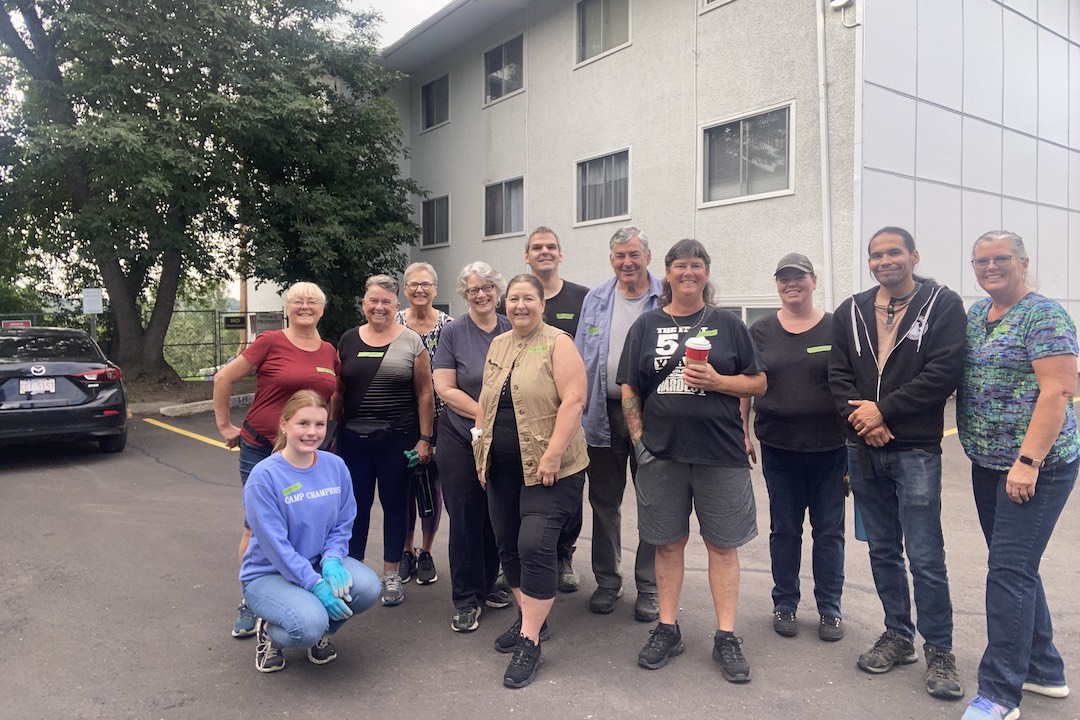The co-founder of the Hoarding Disorder Foundation of Alberta says her organization will run out of funding by the end of the year, even though an estimated 20,000 to 59,000 people in Edmonton struggle with hoarding disorder or behaviours.
Stacy Walker, who helped create the foundation in 2019, said the organization last received funding in 2022 from the City of Edmonton, in the form of a Community Safety and Well-being grant for $89,760. The grant funded training for therapists and professional organizers on trauma-informed support for people in hoarding situations, plus eight "clear-outs" of homes where someone had hoarded. The organization later got funding at the end of 2023 and in April 2024 from the city to continue running its support group, its core service, but that money will run out in December.
"We're unable to offer an awful lot in terms of services because there's no funding, and (the association) is a very young and new organization," Walker told Taproot. "We can't offer a lot in terms of services unless it's grant-funded … We need funding for programming so that we can keep the (support) group running, because that's the absolute minimum that we need to do."
Hoarding is different from most pop-culture portrayals on reality TV shows. The disorder is when someone accumulates things, often without intention or awareness. This in turn can strain relationships, create safety hazards, and prevent a person from performing basic functions in their home such as cooking, bathing, or sleeping in their bed.
Hoarding situations that reach a crisis level can strain public services, including calls to the fire department, the healthcare system, police, and community agencies, Walker said. Hoarding can require the removal of children from a home. Fires at hoarded properties are hard to extinguish, hospital stays may need to be extended if a patient's home is found uninhabitable due to hoarding, and service hours tend to be high for people who hoard because of the behaviour's complexity.
Walker said addressing these challenges proactively can save the system both time and cost. "One client in a hoarded situation would perhaps work with three to seven different agencies," Walker said. "We're talking about between 850 and 1,000 service hours."
Hoarding is not widely understood but more common than many know, Walker said. "We don't keep any stats at an all in Canada, as far as we're aware," she said. "We're using statistics out of the other countries and … the number is 2% to 6% of the population would qualify for a (hoarding disorder) diagnosis." In Edmonton, that would mean up to 59,000 people could be affected.
That figure comes from data collection projects in 2016 and 2018 that Walker helped the Edmonton Hoarding Coalition with. The coalition comprises Sage Seniors Association, divisions of Alberta Health Services, the City of Edmonton, and providers who work in legal, clean-up, and psychiatric services, among other groups.
Walker said Sage's "foresight" within the coalition has been powerful but that its work has not picked up again since the COVID-19 pandemic. Sage is working "off the side of their desk because they don't have funding, either," Walker said.

Hoarding Disorder Association of Alberta co-founder Stacy Walker (left, in red shirt) said hoarding creates challenges in Edmonton, such as stigma, a lack of funding for agencies, and the resulting strains on public services when people can't get help. (Supplied)
Most work the hoarding organization performs is unpaid, unless a grant provides a budget for administrative work, Walker said. While grants are welcome, they are for executing projects and do not fund regular operations, she said.
Walker is a professional organizer trained to work with those who hoard in a trauma-informed way. Her private practice is Gettin' Around to It. She said stigma is "very, very, very" high for people who hoard. Confronting the stigma with education about hoarding disorder and behaviours has become Walker's passion. For example, she said people who hoard often have more than one mental health condition.
Stigma just drives people who hoard away from seeking help, Walker said. "I just think that if it wasn't so stigmatized, and if they thought they were going to get support from somebody that was compassionate and not going to judge them, they might reach out sooner," Walker said. "Hoarding is one of those behaviours that just gets worse. It doesn't get better on its own."
The association is a registered charity that can offer tax receipts to private donors. Walker hopes this presents the option for foundational, recurring funds from philanthropists or companies to pay for operations. To this end, the organization has worked with a fund developer who secured the community safety grant.
Without assistance from organizations like the Hoarding Disorder Association, people in hoarding situations who want or need help must rely on private services. Challenges in that scenario are the expense and the potential lack of empathy that can re-traumatize the client, Walker said.
"It's really rare that we have people that have the financial resources to pay for services," she said. "They don't always get services that are trained in this field … I always try to get people to realize that it's just adding another trauma."
Cases involving seniors are especially difficult, she said. Their hoarding behaviours may intensify over time without intervention, and health issues associated with age only make matters worse.
"It's not a condition that starts with the senior population — it starts many, many years before," Walker said. "It's just that when a senior starts to reach out for supports, maybe they need home care, or maybe they've broken a hip, and they're in hospital. Then, all of a sudden, somebody finds out that their home is not functional."
The association has a page dedicated to education, resources, a home-diagnostic tool to assess hoarding behaviour, and more. There's another page with accounts of lived experiences. Details on the association's support group are here.
Correction: This story has been changed to correct information on grants.
